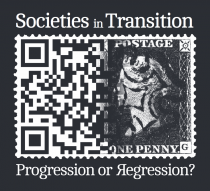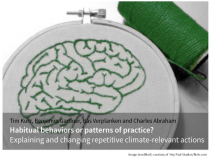- About
- Team
- Projects
- Children and the Environment
- ELiCiT (Exploring lifestyle changes in transition)
- Foundations for Sustainable Living
- HABITs
- Mapping Rebound Effects
- PASSAGE (Prosperity and Sustainability in the Green Economy)
- Policy Dialogue
- Price Responsiveness of Demand in Energy
- Resilience and Sustainable Lifestyles
- Sustainability Transitions in Food Systems
- Sustainable Living in Remote Rural Scotland
- Publications
- News
- Events
Habitual behaviors or patterns of practice? Explaining and changing repetitive climate-relevant actions
| Title | Habitual behaviors or patterns of practice? Explaining and changing repetitive climate-relevant actions |
| Publication Type | Journal Article |
| Year of Publication | 2015 |
| Authors | Kurz, T, Gardner, B, Verplanken, B, Abraham, C |
| Journal | WIREs Climate Change |
| Volume | 6 |
| Pagination | 113–128 |
| Abstract | Understanding human behavior lies at the heart of responses to climate change. Many environmentally relevant behavior patterns are frequent, stable, and persis- tent. There is an increasing focus on understanding these patterns less in terms of deliberative processes and more in terms of habits and routines embedded in everyday life. Examinations of the ‘habitual’ nature of environmentally consequen- tial activities have been approached from two theoretically distinct perspectives. From a social psychological perspective, ‘habit’ is studied as an intra-individual psychological construct that sustains ingrained behavior patterns in stable settings and obstructs adoption of more environmentally friendly alternatives. Sociologists from the social practice tradition, in contrast, have sought to highlight the ways in which resource-intensive ‘habitual practices’ become established and maintained in society through a commingling of material, procedural, and socio-discursive ele- ments. We reflect critically upon key theoretical differences underpinning these two approaches to repetitive behaviors and review empirical work from both tradi- tions that speaks to the relevance of ‘habitual behavior patterns’ central to address- ing climate change. Finally, we examine how changes in habits are theorized and operationalized within both social psychological and social practice approaches, and practical implications for promoting environmentally sustainable societies. |
| URL | http://onlinelibrary.wiley.com/doi/10.1002/wcc.327/pdf |













